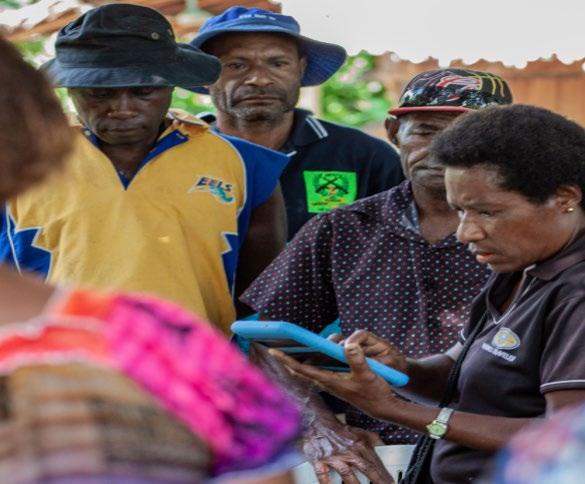
2 minute read
Our Work in System Strengthening
Quality, timely and accessible data is critical to the WASH sector to enable evidence based planning, budgeting, policy making and decision making. Strong data drives inclusive, sustainable and resilient WASH services.
In Papua New Guinea (PNG), the lack of reliable and timely data on WASH services hinders the planning and coordination of WASH service delivery across the country.
Advertisement
With WaterAid’s support, the PNG Government’s Department of National Planning and Monitoring WASH Program Management Unit (PMU) established PNG’s first WASH Management Information System (MIS) in 2018. The MIS uses a mobile phone-based application called mWater for the collection, management and use of WASH data. The government and other organisations working in WASH such as NGOs collect data using standardised survey forms with all data then flowing into the MIS for use by decision makers.
In 2022, we drew on our lessons and experience in Wewak District, East Sepik Province to provide support to the WASH PMU, South Fly District and World Vision to put the MIS into practice by supporting South Fly District Development Authority (local government) to develop South Fly District’s first five-year investment plan.
Together with the WASH PMU, WaterAid trained 35 government officers in South Fly district on the MIS and data collection processes. Over a ten week process government officers collected data from remote rural communities, schools and health care facilities. Through this process the data collection team successfully gathered WASH data from all 157 rural communities, 115 schools and 26 health care facilities across all five local level government areas.
The South Fly District WASH committee and its decision makers have used this data to prioritise communities, schools and health care facilities in most need of investment in critical infrastructure such as climate resilient water supply and support
Public Health Authority staff using the mwater survey tool to collect WASH data in Wewak
WaterAid
for the promotion of sanitation and hygiene improvements.
The five-year plan development process has provided South Fly District with the valuable opportunity to evaluate who has critical roles and responsibilities for planning, financing and delivering WASH services. Using their data-driven plan helps them to adopt new approaches, leverage additional finance and improve WASH service for the people of South Fly District.
The collaboration in South Fly is an example of WaterAid’s approach to strengthening government systems, so that lasting water and sanitation services, and hygiene behaviours will be owned and sustained by government long after WaterAid’s projects have ended.









